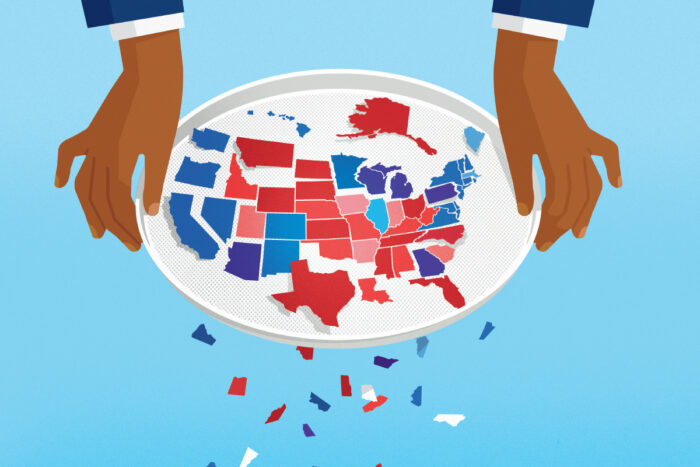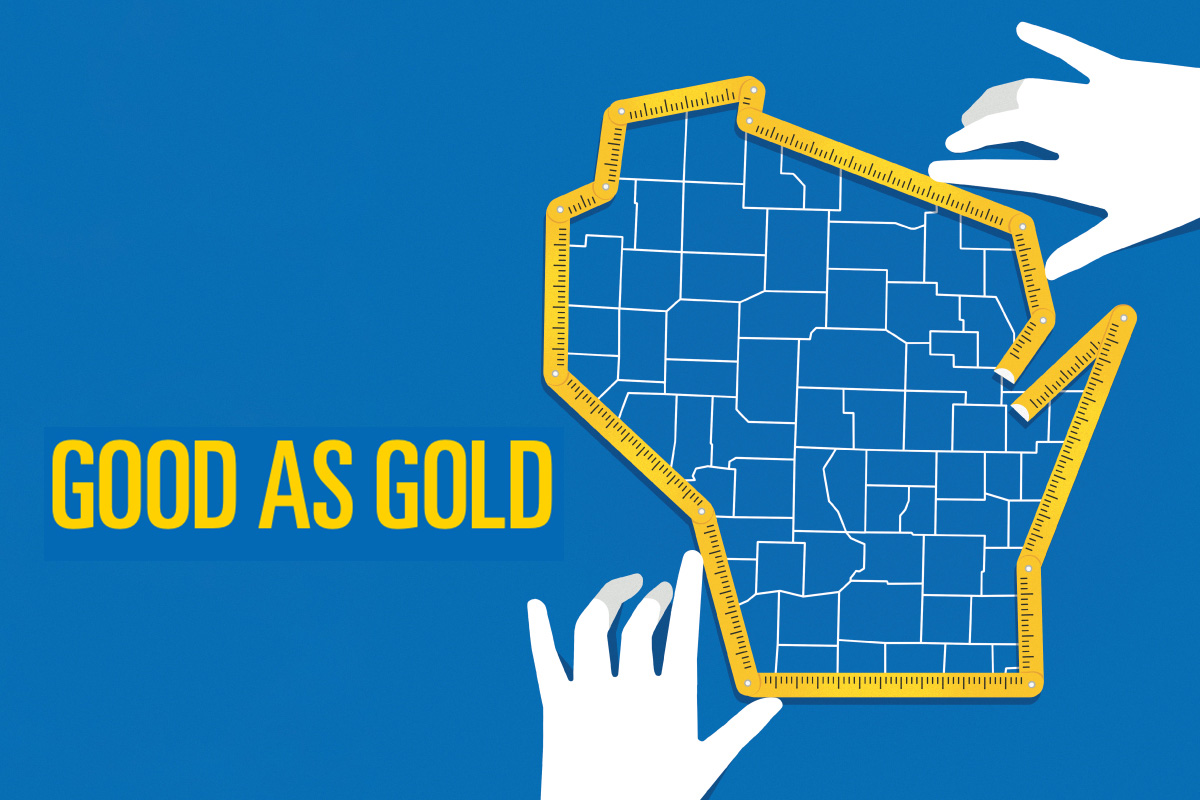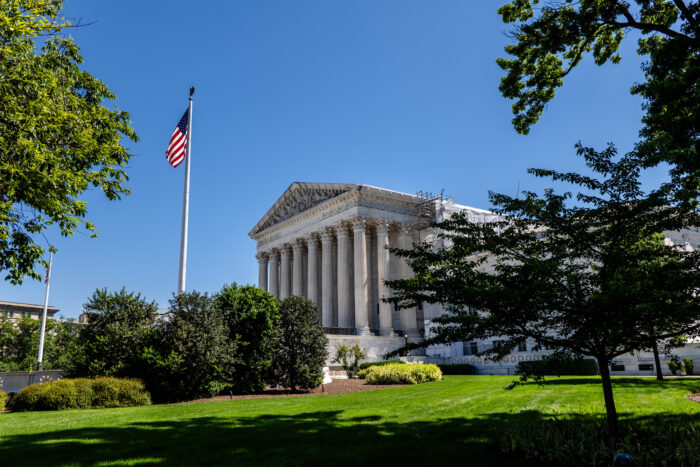At 10 years and counting, the Marquette Law School Poll has set a new standard in Wisconsin polling and become a valued source of public opinion insights in battleground America and beyond.
When a law school took the unlikely step of launching a public opinion poll, anything could have happened. But the Marquette Law School Poll quickly became a hit, bringing the highest standards of polling methodology and issues acumen to an environment rich with lessons to be learned. For our 10th anniversary coverage, two expert observers — Alan Borsuk and Craig Gilbert, both fellows at the Law School — track the depth, frequency and accuracy that have earned the poll its stellar reputation, sketch the backstory of the poll’s birth, and reveal how the poll has transformed our understanding of the electoral landscape in Wisconsin and beyond.
Poll Star
A close-up look at the Law School Poll’s impressive record for accuracy, its stellar media reputation and the story of how it came to be.
By Alan Borsuk
The Marquette University Law School Poll launched in January 2012 with considerable ambitions. Over the ensuing 10 years, it has met them, becoming the most extensive public opinion polling project ever in Wisconsin.
Through 70-plus rounds of polling, tallying responses from more than 60,000 voters on 1,200 unique questions, the poll has built a reputation as the “gold standard” for insight into public opinion in Wisconsin. And it has emerged as a trusted measurer of national opinion since launching nationwide polling in 2019.
Who attests to the poll’s lofty status? Political experts and news organizations, for starters. Since the start of the last presidential election cycle, The Washington Post, The Dispatch, NBC News, Politico and many news organizations in Wisconsin have all used the “gold standard” term to describe the poll under its director, Dr. Charles Franklin, professor of law and public policy. In 2021, FiveThirtyEight, a widely followed website that analyzes political data and trends, gave the Marquette Law School Poll the seventh highest grade for reliability among 500 survey efforts currently active in the U.S.
A decade of political events that put Wisconsin almost constantly in the national spotlight has been paired with a decade of credible information about Wisconsin voters — and the issues they care about — that is without match in depth and breadth.
In this way, the poll has emerged as a cornerstone of Dean Joseph D. Kearney’s vision for a law school that adds vitality to its role of educating lawyers by serving as a “public square” where issues of the day are discussed constructively, whatever the political leanings of the participants. The Law School is now known as a premier convener of issues-based discussions featuring experts and top leaders, and host of prominent local and statewide debates, and the poll is a heavyweight contributor to this dialogue.
The poll’s results this year have generated coverage in The New York Times, Forbes, Fox News, CNN, Bloomberg, Axios — to name just a few. Survey after survey, year after year, this coverage boosts recognition of Marquette itself. In an analysis of Marquette’s influence in the media, conducted for the university in 2019, Marquette led five peer institutions in Catholic higher education in “spokesperson visibility,” with pollster Franklin being quoted more extensively in national media coverage than any other figure at Marquette, including the men’s basketball coach at the time.
“The poll really is the gold standard, not only in the state, but around the country,” Marquette President Michael R. Lovell told WTMJ-AM host Steve Scaffidi during a 2022 interview. “When people think about some of the shining beacons at Marquette, they often mention the poll.”
The poll’s stellar record in forecasting elections allows for a sharp contrast with the couple of times the poll has called it wrong.
“Trump’s two elections were our biggest failures,” Franklin acknowledges. The poll pointed to a Wisconsin win for Democratic candidate Hillary Clinton in 2016, before she lost the state to Trump. It pointed to a victory by Democrat Joe Biden in 2020, but by a wider margin than the actual result. Franklin says one lesson was that some Trump voters were not being reached by polling calls or were reluctant to give their opinion. That led to changes in some aspects of how polls are conducted.
Including the two races involving Trump, the poll has an overall average error of 2.2 percentage points for election forecasts over the decade. “I’m very happy with that,” Franklin says. “Realistically, for polling to be that close in that many races is pretty good.”

The Backstory
What made a law school launch a political poll anyway?
The poll’s roots extend back to the arrival in 2007 of Mike Gousha as the Law School’s distinguished fellow in law and public policy. After decades as a highly respected television journalist in Milwaukee, Gousha in his new position hosted programs on major public matters, including newsmaker interviews, conferences and candidate debates — all as part of an initiative launched under Kearney to make the Law School a leader in cultivating civic dialogue on key issues.
Gousha suggested to Kearney that expanding the policy initiative — now known as the Lubar Center for Policy Research and Civic Education — to include polling would give the public a stronger voice in policy discussions. It wasn’t an instant sell. But with existing prominent polling efforts in the state scaling back even though Wisconsin had become a major battleground state and potential decider of national presidential elections, Kearney agreed there was an opening — and an opportunity to serve.
Franklin — then a University of Wisconsin–Madison faculty member and a polling expert who had served as a longtime member of ABC News’ election night team helping to call races — agreed to become a visiting professor at Marquette Law School and led the poll’s launch in 2012, which turned out to be a momentous year in Wisconsin politics.
“There can be little doubt that the place, time and people are right for the Marquette Law School Poll,” Dean Joseph D. Kearney said at the time.
In the poll’s debut year, there were critics from the left when the final rounds of polling before the June gubernatorial recall election pointed to a victory by Republican Gov. Scott Walker. And there were critics from the right when the poll foresaw a victory by Democratic candidate Tammy Baldwin in the U.S. Senate race. But both elections turned out almost exactly as the poll indicated.
While it’s these “horse race” results involving coming elections that have earned much of the attention, Kearney, Gousha and Franklin (who joined the Law School faculty full time in 2013) emphasize the value of the long and broad record of polling on matters that go beyond elections. Criminal justice, the environment, education — all are tracked carefully, along with Wisconsin’s direction, more broadly. These and many more issues are the subject of polling, across time, revealing trends in newly seen ways.
And three years ago, the team behind the poll saw an opening again — this time for more thorough tracking nationally of opinions on the U.S. Supreme Court and the issues before it. The poll began conducting annual nationwide surveys in 2019 and increased the frequency of polling on court issues to approximately once every two months in 2021. As the Supreme Court attracted increased attention with major decisions on issues such as guns and abortion, so did the Marquette results.
“At the start, we all believed we could provide a real public service,” observes Gousha, who stepped back from full-time duties at the Law School in late 2021 and now serves as senior adviser. A decade later, he says, “It’s been a successful and valuable service to the people of Wisconsin and to policymakers in Wisconsin who get a better sense of what the people are thinking.”
Alan Borsuk is senior fellow in law and public policy at the Law School.

How the Law School Poll Changed My Life
A celebrated political reporter, now a Law School fellow, reveals how Marquette’s remarkable poll transformed what’s known about the Wisconsin electorate — and left him forever changed.
By Craig Gilbert
By the time the Marquette Law School Poll came along a decade ago, I had spent more than 20 years on the Wisconsin political beat.
I reported from every byway, county fair and fish fry on the Badger State campaign trail. I obsessed over the minutiae of precinct returns from Cottage Grove to Cuba City.
And like political junkies everywhere, I pounced on new election polls as if they were catnip.
This last habit was an irresistible but perilous one. For even the most experienced political reporters, it was an occupational hazard trying to separate the polling gems from the polling junk and identify meaningful political trends and patterns from surveys that would come and go, using different methods and spewing out sometimes wildly conflicting results. (And I like math!)
All that changed in a very good way in January of 2012 when political scientist Dr. Charles Franklin conducted his first Marquette Law School Poll survey. As a professional Wisconsin political obsessive, I don’t think there are too many people out there who can appreciate this fact more than I do. It came along in an era when Wisconsin had become what is arguably the premier battleground in American politics, a tipping-point state of unflagging interest to political observers inside and outside its borders.
It also came along at an important moment for me journalistically — when I was trying to take my political reporting and analysis in a much more rigorous and data-driven direction.
The Marquette poll gave me way more data to work with than I’d ever had, led to countless insights and occasional epiphanies, and made all sorts of stories possible that couldn’t have been written without it.
For me and others, it became a uniquely valuable resource: a reliable, accessible, transparent, high-volume (70-plus polls over 10-plus years) source of survey data on a single state of giant electoral significance.
The result is a portrait of public opinion in Wisconsin that is richer than anything that exists anywhere else in battleground America.
Let me start with some examples.
The Marquette Law School Poll began during the first terms of President Barack Obama and Gov. Scott Walker. We learned very quickly from the new poll just how much the governor’s dramatic push to curtail public-sector unions in Wisconsin (and the fierce opposition it spawned) had polarized public opinion.
It seemed as if everyone loved or hated Walker, and the polling confirmed that. More Wisconsin voters could express an opinion about the governor than about the president — which is simply mind-boggling if you think about it. In one Marquette survey, only 1 percent of voters were undecided about Walker’s job performance; everyone else either approved or disapproved, dividing deeply along party lines with opinion etched in stone from one month to the next. The Marquette poll’s frequency allowed us to appreciate just how entrenched and immovable public opinion about Walker was from 2012 through 2014.
We also learned from the polling that the governor and his policies retained enough support from independent voters to help him withstand a recall in 2012 and get re-elected in 2014. In its first year of existence, the Marquette poll documented a phenomenon that perplexed many: the “Obama-Walker voter.” About one in 10 voters supported both men. One lesson was that even in a polarized world, swing voters still exist and matter.
A few years later, the Marquette poll showed how Walker’s presidential bid compounded a growing “Walker fatigue” in Wisconsin, a harbinger of his failure to win a third term in 2018, even though most Wisconsin voters thought the state was headed in the right direction.
Thinking back, this new polling project was providing us political junkies with more catnip than ever. But it was also providing something else: the tools to map the Wisconsin electorate and measure the profound changes it was going through in the age of polarization. And soon the expectation-defying emergence of Donald Trump would provide its own lessons about both the value of in-depth polling and some of its limitations.
In the run-up to Wisconsin’s April 2016 presidential primary, I drew on Franklin’s survey data to outline a striking pattern in the Trump polling. Among Republican voters, Trump was least popular in the most Republican part of the state — the suburban “WOW counties” outside Milwaukee (Waukesha, Ozaukee and Washington) that for decades formed the bedrock of the GOP in Wisconsin. The farther away from metropolitan Milwaukee, the better Trump polled. (The volume of polling by Marquette made that story possible by producing sample sizes big enough to identify regional patterns within the state). And sure enough, that’s exactly how Wisconsin Republicans voted. Trump carried the more rural north and west but got hammered in the southeastern suburbs, costing him the statewide primary vote.
Marquette’s polling had precisely captured a recurring rural-suburban split in the GOP. Yet the challenge for Marquette and other polls that November and again four years later was adequately capturing Trump’s true level of support. It turned out that pro-Trump voters, many of them blue-collar and rural, responded to surveys at lower rates than other voters, possibly out of mistrust. As a result, the polls underestimated his vote, contributing to the shock factor of his victory in states such as Wisconsin that Republicans hadn’t carried in decades.
Beyond Trump, Marquette’s polling has charted how Wisconsin has gone from a state where Democrats outnumbered Republicans by 4 or 5 points to one where there are just as many (if not slightly more) Republican voters than Democratic ones. It has documented how non-college-educated white men have driven that shift.
The poll has captured two other broad political realities: the extreme degree of voter polarization along party lines (making split-ticket voting rarer and rarer); and how partisan fault lines on policy preferences are far less absolute. Like Democrats, Republicans may overwhelmingly vote the same way as other Republicans. But they vary more than you might think in their views on issues ranging from abortion to taxes to health care. Public opinion has lots of gradations, and the dividing lines aren’t as absolute as we sometimes portray them.
With more than 60,000 interviews and more than 1,200 different questions in the Marquette database, I’m merely scratching the surface here. Now that I’m a Lubar Center Fellow with the Marquette Law School, I am more steeped than ever in Franklin’s polling.
But the great thing is that you don’t have to be a political reporter or party strategist or a Marquette Fellow to play this game. This lode of opinion data, political nuggets and social science riches is all yours. The Marquette poll comes with little-known interactive tools on the web. Accessible at law. marquette.edu/poll, they make it easy for anyone not only to search for the results of any individual survey or any question over time. You can plunge into the fine-grained “cross-tabs” and explore how opinion in Wisconsin — and more recently, the nation as a whole — breaks down along all the demographic and political divisions that define our place and time: age, gender, party, education, religion, race, you name it.
That’s not catnip!
Craig Gilbert is former Washington Bureau chief and national political reporter for the Milwaukee Journal Sentinel. He is currently a fellow at the Law School’s Lubar Center for Public Policy Research and Civic Education.




